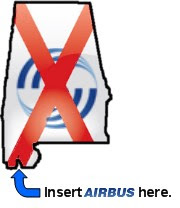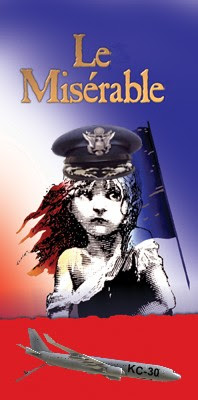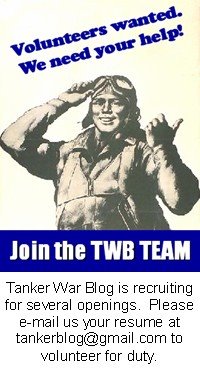 Fresh from swift boating General Handy, KC-30 supporters hit a new low this week by forming a front group called Alabamians to Build American Tankers (ABAT). They are running a smear campaign with radio ads and have set up their own website at bettertanker.org.
Fresh from swift boating General Handy, KC-30 supporters hit a new low this week by forming a front group called Alabamians to Build American Tankers (ABAT). They are running a smear campaign with radio ads and have set up their own website at bettertanker.org. Here is the text of the ads:
Ad #1 - Alabamian Confronts BoeingJust who is ABAT and who is funding them?
MAN: Boeing deserves the Air Force Refueling Tanker project because it's an American company employing American workers.
ANNCR: And Alabama where a better tanker would be built isn't in America?
MAN: You know what I mean, no sense creating new jobs in Alabama when we can do the work up in Washington State.
ANNCR: So 2500 new jobs in Alabama wouldn't help our national economy?
MAN: You can't build planes in Alabama.
ANNCR: Your company trusts Alabama workers to build high tech weapons, rockets and space vehicles.
MAN: But our Boeing planes are ready now.
ANNCR: Ready now? You mean the ones you promised Italy four years ago? Are those ready yet?
MAN: Hey, we're Boeing.
ANNCR: And the Alabama plane is newer, with better technology.
MAN: Hey, we're Boeing.
ANNCR: And the Alabama plane can carry more fuel, more passengers and more supplies.
MAN: Hey, we're Boeing.
ANNCR: Is that all you can say?
MAN: What else can I say? Clearly Alabama has a better tanker.
ANNCR: Paid for by Alabamians to Build American Tankers
Ad #2 - Boeing Can't Win
EFCT: Sound of jet engine whining along coming in several times during the ad
ANNCR: It seems like every time we hear about Boeing and military contracts we hear about cheating. The reason we are still trying to replace our aging refueling tankers is because Boeing executives were involved in a scandal of bribery and cheating in the last bid. Our Air Force is working hard to protect our country but it appears that Boeing's corporate policy is "if Boeing can't win no one can"...and that means our troops lose.
EFCT: Engine sputtering
ANNCR: May day may day
ANNCR: Paid for by Alabamians to Build American Tankers
Ad #3 - Alabama Can be Trusted
ANNCR: Boeing says America's in danger if Alabamians build refueling tankers for our troops. Boeing claims military technology will wind up overseas. Boeing's one to talk. Last February their engineer was arrested for sending trade secrets to Communist China. And, in June, the FBI caught a Boeing scientist with top secret defense information on his personal laptop. No telling where those secrets were going.
ANNCR: At lease we can keep a secret in Alabama. Paid for by Alabamians to Build American Tankers.
We would guess the members are a select group of people who either have been brainwashed by the local papers and pandering politicians or those who would benefit from an Airbus facility in Mobile. This seems to be the case as a news story on ABAT lists Mobile locals Bryan Lee, attorney/lobbyist Palmer Hamilton, real estate developer Paul Wesch, and accountant Mike Thompson as members.
We will not venture a public guess on who is funding them, but we probably all know who that is already.
We do know for sure that a PR firm that is doing work for ABAT is Strategy Public Relations in Mobile Alabama. And, a Ms. Krista Burroughs appears to be running at least the website efforts of this shameful campaign.
On Strategy's website it states Krista has:
"over 17 years experience in public relations, Krista is responsible for supervising our production quality and makes sure client services are delivered on schedule and on budget. In addition, she possesses strong and diversified managerial and administrative skills, over seeing day-to-day agency operations. Krista is also proficient in desktop and graphic design, having developed a number of various collateral and time-sensitive pieces. She is a certified webmaster, specializing in the industrial and entertainment field, and serves on the board of directors for the Mobile International Festival."Well, she can now add outrageous propaganda director, EADS/Airbus apologist, and corporate attack ad specialist to that resume.
If you would like to comment either for or against her work please feel free to e-mail her at krista@strategy-pr.com, call (251) 432-9200, or even fax (251) 432-9209.
The two other members of the firm can be reached at dave@strategy-pr.com and jon@strategy-pr.com. You can track down the actual ABAT members and contact them on your own if you wish, but remember the old Southern saying about wrestling with a pig. You both end up dirty, but only your opponent enjoys it.
Boeing issued this response to the ABAT ads:
We have no idea who this group is or how it is funded. Boeing is the largest aerospace employer in Alabama. These ads are an affront to our more than 3,000 hard-working, highly-talented employees and their families in the state. They are also clearly a sign of desperation in support of our competitor. The ads do a disservice to our customer, the men and women who serve our country, more than 160,000 Boeing employees, and to Northrop-Grumman/EADS.It is good to see Boeing taking the high road, but very disheartening to see some KC-30 supporters creating new ways to sink even lower.
The GAO ruled that the recent tanker competition was seriously flawed and that the award to Northrop-Grumman/EADS should be recompeted. Our focus will remain on the new competition and getting the best technology to the warfighter and the best value to the U.S. taxpayer.
(If anyone needs to know who really has the better tanker they can visit us at Tanker War Blog anytime.)


























 Stumble It!
Stumble It!